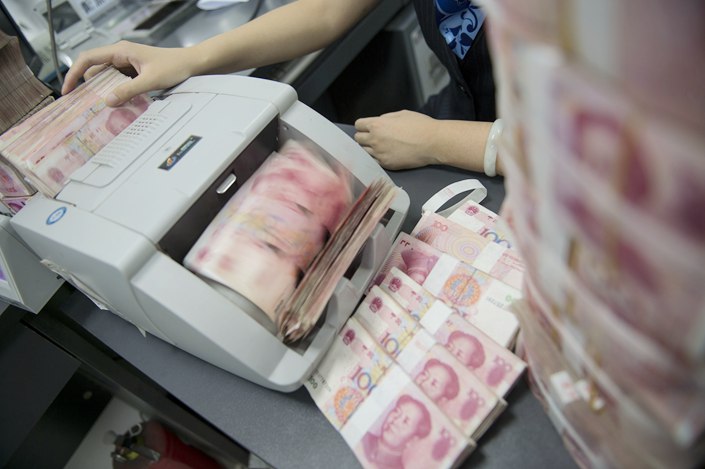China Expands Funding Sources for Debt-to-Equity Swaps

Chinese regulators expanded funding sources for commercial banks to invest in debt-to-equity swaps in a set of newly issued rules intended to bolster a program designed to reduce leverage in the economy.
Asset investment companies (AICs) controlled by major banks are now allowed to set up investment plans with debt-to-equity swaps as underlying assets, including convertible bonds, debt-to-equity special bonds, ordinary shares, preferred shares and debt-to-preferred shares, the China Banking and Insurance Regulatory Commission (CBIRC) said Wednesday in a policy document (link in Chinese).
Qualified retail investors, insurance funds and pension funds will be allowed to invest in the plans.
Since 2016, China has made debt-for-equity swaps a key part of its agenda to lower leverage ratios in the heavily indebted corporate sector and reduce lenders’ bad-loan risks.
As of April 2019, 909.5 billion yuan ($128.8 billion) of debt-to-equity swaps were carried out, including 254 projects conducted by AICs involving 400 billion yuan, according to the most recent data from the National Development and Reform Commission.
The top banking regulator in 2017 approved the establishment of AICs by five largest state banks — the Industrial and Commercial Bank of China, Agricultural Bank of China, Bank of China, China Construction Bank and the Bank of Communications — as the leading players in the strategy.
AICs can raise funds for the investment plans through private sales to as many as 200 qualified investors including insurance and pension funds under the new rules. Industry sources said the move will expand AICs’ funding sources to conduct debt-to-equity swaps and boost equity financing in capital markets.
AICs have mostly used their own capital or funds raised from bond sales, interbank lending and borrowing from parent banks to invest in debt-for-equity assets. Since 2018, the five AICs have issued 100 billion yuan of bonds to fund debt-for-equity swaps.
However, AICs still face difficulties raising enough to conduct debt-to-equity swaps due to constraints on funding sources, said Zeng Gang, deputy director of the National Institution for Finance and Development, a government-linked think tank. The new rules “will solve the problem and expand AICs’ capacity to conduct the business,” Zeng said.
“Fundraising is a major challenge,” said an AIC source. “Without the ability to issue investment products, it is difficult to” mobilize funding.
Under the new rules, retail investors can invest in products backed by debt-to-equity assets if they have net family assets of more than 5 million yuan ($705,000) or personal income of at least 600,000 yuan in the past three years. Institutional investors qualified for the investment should have more than 20 million yuan in net assets by the end of the previous year, according to the rules.
Each investor should put no less than 3 million yuan in a single debt-to-equity investment plan, the regulator said.
The requirements for investors are higher than for other asset management products because debt-to-equity swaps often involve higher risks, said Liao Yuanyuan, a senior official at the CBIRC.
Investment plans backed by debt-to-equity swaps fit only certain investors as they require longer investment terms to generate profits, Zeng said.
Under the new rules, the investment products should be managed as closed-end funds, and investors can transfer shares during the period. Such terms offer greater liquidity and will attract more investors who prefer shorter-term investments, Zeng said.
Wu Yujian contributed to this story.
Contact reporter Han Wei (weihan@caixin.com) and editor Bob Simison (bobsimison@caixin.com)
Caixin Global has launched Caixin CEIC Mobile, the mobile-only version of its world-class macroeconomic data platform.
If you’re using the Caixin app, please click here. If you haven’t downloaded the app, please click here.






